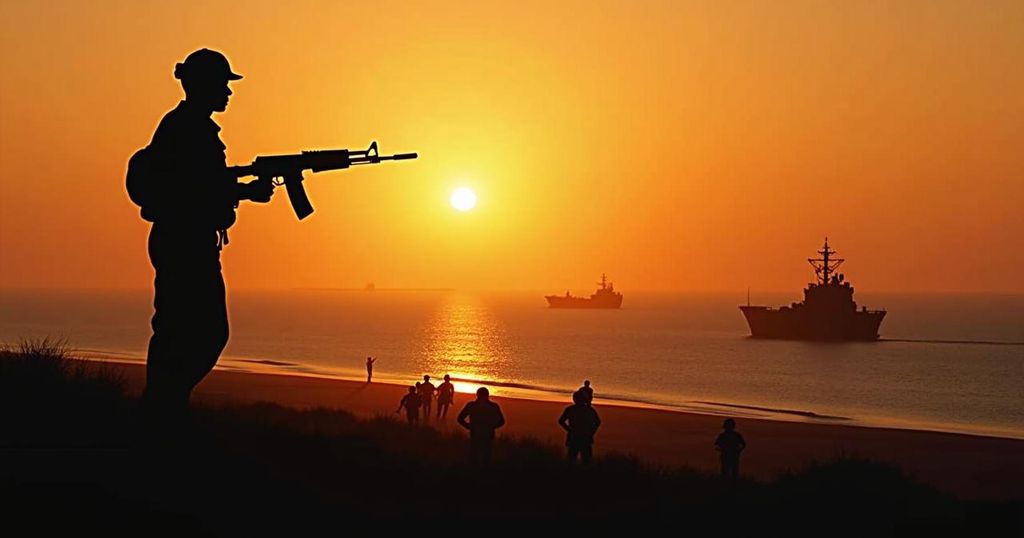Somalia Challenges Ethiopia’s Red Sea Military Aspirations
Somalia opposes Ethiopia’s military ambitions in the Red Sea following a contentious agreement between Ethiopia and Somaliland. This agreement has prompted fears of destabilization and increased military readiness among neighboring nations, particularly Somalia and Egypt. The situation highlights the complex interplay of regional power dynamics and national interests as Somalia seeks to rally domestic and international support for its sovereignty.
Somalia’s President, Hassan Sheikh Mohamud, has strongly criticized Ethiopia’s recent maneuvers aimed at military influence in the Red Sea, perceiving them as an ambition for regional hegemony rather than merely gaining port access. This denunciation follows a controversial agreement between Ethiopia and Somaliland where Ethiopia would attain access to the Red Sea, contingent upon recognizing Somaliland’s independence—an act Somalia considers a blatant infringement on its sovereignty. The repercussions of this agreement have ignited significant diplomatic and military tension throughout the Horn of Africa. In concert with its allies, particularly Egypt, Somalia interprets the agreement as an expansionist endeavor by Ethiopia that threatens to destabilize the region. Egypt’s military backing for Somalia, intended to mitigate Ethiopian power, marks a notable shift in the geopolitical landscape in this area. President Mohamud’s statements reveal widespread apprehension regarding the strategic consequences of Ethiopia’s access to maritime routes, which critics suggest aims to reshape the geopolitical environment of crucial waterways. In response, both Somalia and Egypt have heightened military readiness, with Egypt signaling a willingness to deploy troops in Somalia following the conclusion of the African Union’s peacekeeping mission. Compounding this volatile situation is Ethiopia’s longstanding ambition for sea access, a privilege it lost following Eritrea’s independence. Recent military and economic collaborations, such as the partnership with Turkey, indicate Ethiopia’s efforts toward redefining its standing in the region. Such developments have alarmed Somalia and attracted the scrutiny of the international community, as nations vie for influence amidst these evolving dynamics. Somalia has responded officially by mobilizing public support against the agreement, orchestrating substantial protests in Mogadishu, and appealing for international disapproval of Ethiopia’s actions. While the global community, including significant powers like China, has expressed solidarity with Somalia regarding its territorial claims, the situation reveals intricate national ambitions and the quest for regional stability. This unfolding scenario not only brings to light the precarious nature of territorial disputes in the Horn of Africa, but it also underscores how such agreements can potentially transform the legal framework governing international maritime navigation and security accords in one of the world’s strategically vital areas.
The Horn of Africa stands as a critical region influenced by a myriad of national interests and historical grievances. Somalia, having faced internal strife and external pressures, views the agreement between Ethiopia and Somaliland as a potentially destabilizing factor. Ethiopia’s historical aspirations for coastline access, particularly following Eritrea’s secession, elevate tensions, with regional powers like Egypt looking to assert their influence in counterbalance. The dynamics of this situation are exacerbated by the strategic significance of maritime routes in international trade and security.
In conclusion, Somalia’s opposition to Ethiopia’s military ambitions in the Red Sea is rooted in concerns over sovereignty and regional stability. With Egypt’s military support enhancing Somalia’s position, the geopolitical landscape in the Horn of Africa is witnessing significant shifts. The potential military escalation and international implications of Ethiopia’s strategic agreements underscore the ongoing volatility of territorial and maritime disputes in this pivotal region.
Original Source: www.garoweonline.com




Post Comment